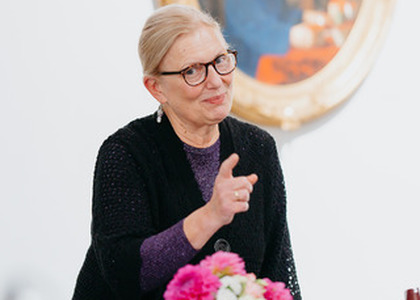> [Archived] Interviews

Interview with Ioana Voicu Arnăuțoiu
Ioana-Raluca Voicu-Arnăuțoiu will hold on Tuesday, October 31st, 2023, a new conference under the auspices of the project "Houses of Musicians - Dramas of the communist period", entitled "Antonin Ciolan - Lotul Bădescu".
The event organized by the "Opus" Association will be hosted by the Institute for the Investigation of the Crimes of Communism and the Memory of the Romanian Exile, starting at 7:00 p.m.
Mrs. Ioana Voicu Arnăuțoiu, on Tuesday, October 31st, you will be holding the second conference in the series "Houses of Musicians - Dramas of the communist period". The theme, this time, is "Antonin Ciolan - Bădesculot ". Biographies hidden in the archives, from which you will bring back to life the story of the musician Antonin Ciolan and the lyrical artists from the so-called "Bădescu lot". Do you remember what your first thoughts were as you were going through the pages of the CNSAS files?
The files of Antonin Ciolan and those of the "Bădescu lot" are extremely impressive. Antonin Ciolan's documents reveal his thoughts in attempt to defend himself from the suspicion of being a war criminal, but they are also veryvaluable documents regarding his career and the repertoire he performed while he was a conductor at the Odessa Opera. When it comes to reading them, his memoirs are considered a real treasure, and also a very good source of information for those who study Ciolan's personality,
And the 16 volumes of the files of the singers who were arrested and tried in the "Bădescu lot" are also extremely interesting, revealing their personality, their rather difficult life, their study, their dedication to perform at the highest level on stage. I would like to mention their names. Apart from Dinu Bădescu, Șerban Tasian was tried alongside him, Cornelia Gavrilescu, Valentina Crețoiu and the accompanying pianist Viorica Cojocaru... these are the people who, in 1962, became the target of a trial, being accused of conspiring against the social order, which seems quite ridiculous for people deeply devoted to music and their profession.
How do you see the human side of Antonin Ciolan, as shownin the records left in the security files?
First of all, we can notice his personality from the two memoirs found in his criminal record, revealing an extremely honest man. He gives off an overflowingly sincerity and somehow naivety. He attempts to explain to the authorities what he actually did, the fact that he was a simple conductor, that he tried to promote high-quality compositions, and how many dozens of performances he conducted... Anyway, compared to the aggressive style in which he was being investigated and the fact that the prosecutors wanted to see how much money he earned, if he has hidden accounts... the honesty of his memoirs is absolutely disarming and I mustadmit that it was a great pleasure to discoverbehind these documentsa musician of his excellence and an extremely honest and sincere man.
The abusive treatment applied to the conductor Antonin Ciolan by the communist regime is not singular, unfortunately. What can you reveal to us about your research related to the so-called "Bădescu lot"?
The singers accused and investigated in the "Bădescu lot", likewise, are subjected to almost inhuman methods of investigation. The fact that their personal lives were probed through the microphones installed in their homes (we are talking about the mid-50s), that they were under surveillance and suspicision, and that Dinu Badescu was accussed of spying for Great Britain - these accusations are of anutter abusrdity. In fact, I find them very suspicious, 4-5 people of a high professional excellence, singers who graced the stages of the Bucharest Opera for decades, who made Romania famous everywhere they sang - in Vienna, in Paris, in Italy. They received a completely inappropriate treatment for some people who dedicated themselves to the stage and music, and by no means had any other intentions.
Of course they criticized the regime because it was extremely restrictive. They could no longer perform abroad, they could no longer be contacted by the impresarios who, for years, brought them to the world's stages. But from punishing negative comments about the leadership of the party, the USSR and the country, to accusing them of conspiring against the social order, is a widegap and an extreme abuse.
What fate do you think these detailed researcheson the lives of Romanian musicians, presented in the conferences on October 25th and 31st, should have, and how do you wish the generation born after 1989, who may not have experienced the constraints of the communist regime, to perceive it?
I think that the history of Romanian music should record these things, because they were part of the musicians' life, who went through this period of history. It's better for these things to be understood, and the sacrifices they made to have such an artistic quality under extremely difficult conditions serveas a life lesson that young people living now in freedom, should definitely learn from and think what it's like to prepare for a concert, a tour and not know if you will go or not because you don't have a visa, because you don't have a passport and because someone can say "Stop it! Regardless of who they are, they should stay in the country.".
These are the lessons we should all learn. What it means to be the best you can bein your profession, and especially in art, to have this creative side that you must use in extremely difficult and restrictive conditions.
Photo credit: Anda Aron
Translated by Tania-Ana Lupu,
University of Bucharest, Faculty of Foreign Languages and Literatures, MTTLC, year I
Corrected by Silvia Petrescu














